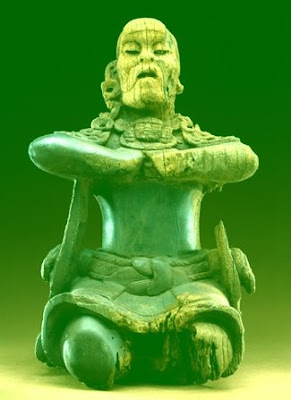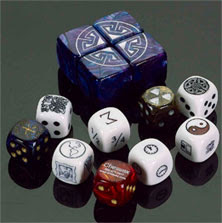A man enters the subway train in the compartment where SC is seated. The man is accompanied by a whole bunch of extremely noisy children (his). The man is calmly sitting down next to SC while the kids go about creating mayhem of sorts which disturbs many an American soul in the train. SC, after giving the due pause in the hope that things would settle down, turns to the man and requests him to rein in his children (in very soft and sweet words). The man "wakes up" to the situation around him and apologises to SC. He proceeds to explain to SC that his wife had just died and they are returning from the hospital. He hasn't been able to explain things to his children and hence, they are just being themselves and he didn't notice as he was collecting himself too. SC says: Suddenly you see things differently and that that is a paradigm shift.
I call that fairly irrelevant. If the kids are disturbing everyone, then that doesn't change because the man's wife died. Undoubtedly one sympathises with the man and realises why he wasn't acting on his children's conduct, but that the children need to be quietened down is still required as it is causing a lot of discomfort to others. Or the man should announce that he is in such a situation and hence all passengers should hold back their discomfort! There is nothing hard-hearted (a heart of gold?) or cruel about this outlook. If I were in SC's place, I would have sympathised with the man and enquired into the cause of the mishap and probably offered help in quietening the boys, but the latter task is required as the crowd was getting disturbed. Or the man offers to pass on the unfortunate piece of information to everyone and everyone helps in managing the kids. People start engaging the kids and make them less unruly and noisy. The man is left to his grief and confusion. Whatever, but a situation of inconvenience to creatures (human or otherwise) other than oneself, should be addressed and not left to the tolerance of others (and top it with an expectation that they better understand and tolerate it). Hence, if SC had not found out and met my friend then my friend would have fielded SC's complaint with a "You don't know what that man was going through or what was running in his mind. You don't know whether he was going through a divorce, death, loss of job, indigestion or whatever. Hence, you cannot say that he was being inconsiderate."
Technically, I can say anything!! :-) Point is, the man was being inconsiderate and that inconsideration stemmed from unconsciousness (which, as I said, is fairly irrelevant). That SC realised the cause of unconsciousness and managed (?) the situation that had arisen from the man's inconsideration doesn't make the act less inconsiderate. Being inconsiderate is not a crime or a punishable offense (at least not always), nevertheless it is a cause of concern for people around the inconsiderate person. How long does it take for a man to pull in his children and request them to stay put? How simple it would be to take them all in a cab so that his grief and confusion are contained? Isn't it far more complex to expect total strangers and several of them to immediately realise that this man is in a state of grief and hence, the acts of sons should be instantly pardoned?
This brings us to several different modifications to the above scenario. What if I have a major tiff with my manager and then shout at the vendor at the gas station? Should the vendor be expected to understand my mental state? Should he then swallow all need to explain the situation as it was instead of how I have perceived it in my state of anger!? And this goes on ad infinitum, ad nauseum!?
Which is what brings me to the need for a gold standard of human conduct. The conduct could well contain the need to never assume that the person who is being a nuisance is doing so intentionally or with malefic intent, and I am ok with it though I would also like, then, to include the need to not burden everyone with the difficulty that one is going through. I am ok with anything that everyone agrees with, accepts and follow. I am dead against something which people like other people to follow but have no inclination to adhere to, as it goes against their self-interest. That is being damn parasitical! Oh! I so love that word. In it is carried all the truth of human base intent and pettiness which people refuse to acknowledge. The sheer shock and revulsion that is observed on the face of the recipient of that title is apt.
My friend was convinced that having a gold standard would be ideal though he recognises that it is impossible to have one. He believes so because "people are different". I believe so because people in their need for self-preservation and self-propagation will do anything to ensure that they are not inconvenienced or harmed. That "anything" includes violating any commonly constructed gold standard. So, my friend and I agree (but for different reasons) and are happy!! :-)
Let me illustrate why having a gold standard is vital. Consider that you live in a small village of about 20 families and houses. If you believe that thieving is wrong and assume that others too believe in the same, you might be encouraged to leave your door unlocked and all your valuables lying around in the house. You return home after a day's labour to find them all gone. You realise that asking people if they have seen those items leads to hostility. So you go about earning enough money to replace those objects. Again, one day, you return home and find them all gone. This goes on. What do you do? I, personally, would meditate on the Taoist question of why hold anything valuable. But my meditation leads to another question: Even if my mattress is the only thing I have and I do not hold it valuable should I not be concerned when it goes missing? Should I learn to sleep on the hard earth? What if my clothes are stolen? Should I learn to walk around naked?
Does this mean that I too go about stealing!? Personally, I wouldn't. I would simply leave the village with whatever little I have, and if I find all villages to be the same, then I will go and settle on an uninhabited island. I realise that this constant escaping is not eternally sustainable. Maybe I can do a Galt-ian move and collect all like-minded folks and create an Atlantis for myself. Whatever!
I hope I have impressed upon the reader the need for a gold standard.
Now let me explain why Nature created the seed. The seed is a precursor to all the wonderful architectural concepts of patterns (and Christopher Alexander is a man I bow to) or the notion of kernel and core systems that software industry recognises (and there are few to none in this industry whom I bow to). The seed is the essence of whatever must and can grow from therein. Am I making sense? The seed is the distillation of all that goes into an apple tree or a shrub or even weeds. As Master Ugway points out to Master Shifu: "Ah yes, but no matter what you do, that seed will grow to be a peach tree. You may wish for an apple or an orange but you will get a peach." Oh! btw, that was from Kung-fu Panda. What all this means is that the gold standard is nothing more than a seed. A seed which will always grow to be a human being whose fruits will be noble and honest. Some will produce less fruit, some more, but all will take pretty much only what they need and do so in an honest and noble way. Those who produce no fruit will be firewood (and without regret). Those who produce lots of fruit will one day be left bare and will also be infested with all kinds of pests and insects. But they will all be noble and aware of the one Truth that Nature effortlessly instills in all its creations, except man, for man wanted a mind in lieu of Nature's guiding hand. Everyone else chose Nature soft hand that only nurtures.
The seed is also the basic minimum that spans across all cultures and geographies. It isn't an IBM mainframe which tries to capture all with the philosophy of one-size-fits-all. Let us create a quick little seed and observe how it is also a potential gold standard.
In all interactions, if a person is honest and lives in the midst of people who are honest, then there is nothing to fear. If I did not do my homework, and I tell my teacher that I did not, my teacher could punish me. If everyone does that I do not consider the option of lying just to escape punishment. I, instead, focus on completing my homework always (since that is the only way to avoid punishment, or I drop out). No matter what I do, I do it with honesty and hence, with a respect for another person's need to base their actions based on my word/actions. If I live in a village where everyone only lied (and not merely stating the opposite which is a lie but is also readily available to providing truth by inference) then life would be nearly impossible to lead. Hence, honesty can be an element of the gold standard.
I shall leave it to the reader to realise why not harming anyone intentionally, taking not more than what one has or can give and helping all creatures co-exist are elements that can enter the definition of a gold standard without causing cultural/regional/geographical/racial anomalies. A simple seed!!
1. Honesty
2. Not harming anyone
3. Taking commensurate with what one has to offer
4. Treating all elements of the Natural world with equal importance and value
That is it! 4 facets to the gold standard and this is something that human beings find so difficult to adhere to. There are folks who do adopt these and there are millions of people who do not. It requires putting the common good before the self. It does not imply loss of individuality, but simply the chopping away of elements of the individuality which are detrimental to a collective non-parasitical living. BTW, point 3 can also be (partly) interpreted as not doing what you wouldn't want others to do to you.
What this ensures is wherever a person may go, all the people he meets will have these values effortlessly inherent in them. The person you meet might eat with his hand or break wind in public, but he will still have all of these. He might expect that you eat a lot to show your gratitude and a lot of minutia which do not make living impossible.
I read this article from Boston Review. Please realise that there is nothing inherently right or wrong in any stance you take for the scenarios mentioned in the article (or in the surveys mentioned). What the author addresses is a related issue. The point I raise in the previous paragraph is what Turiel's thesis summarises as "the distinction between conventional violations, which depend on local authorities, and moral violations, which do not."
In the article you will also find an insight (which has been used to probably strengthen some other point) coming from natives in Zimbabwe. Understandably, tribesmen, animals and Taoist have this in common. There are no morals and no rules - only the proper way (Tao). Hence, I unconsciously (and now I am glad I didn't use any other word or phrase) used the phrase "effortlessly inherent" in a previous paragraph. The natives say that the closest word that they have for the English "morality" is "tsika" which means "good manners" and maybe more particularly "the proper way to greet people".
Why did I place point 2 in my gold standard? Because I feel that it is vital. I was surprised (and let me assure you this article was written over time and the external article was read just now. Hence, the motivation to publish this article) to find that scientists have observed this about human beings:
Another hypothesis is that children acquire the notion of “wrong” actions in their second year, once they are old enough to hurt others and experience firsthand the distress of the victim.
Do I believe all of scientific literature!? :-) Does it matter!? :-) E.g. after reading the article I am still wondering why "Licking the dirty toilet" is immoral!! It might be crazy, eccentric, unhealthy or disgusting, but why immoral?
So where does all of this leave us? We could adopt a gold standard and stick to it, or promise to adopt one once everyone on Earth does the same (resulting in deadlocks), or condemn the notion of gold standards as it makes machines out of men (as much as it makes machines out of peach trees or hummingbirds). One might rush to say that Ayn Rand was suggesting just the same (and some very interesting human beings think that all she was advocating was rudeness. Frankly, my dear, that was when I realised how scared a human being can be in the face of simple truth) though many (including myself) would disagree. Some might say that one can only control oneself and hence, we can be the only ones to adopt a gold standard and expect nothing from others. That, as many (including myself) believe, leaves one in the situation of the man finding his house burgled. Adopting a religion or a god-man (sic) takes us nowhere. Having met people who believe they are devotees of a god-man (sic) and spew out bromides, but behave like any of the "un-realised" ones leads me to believe that that path takes us nowhere. Running away from everything might seem to be a solution but having met people who tried that I personally believe that that doesn't help establish or disprove the need for a gold-standard.
So, really, where does all of this leave us? Nowhere right here.




















